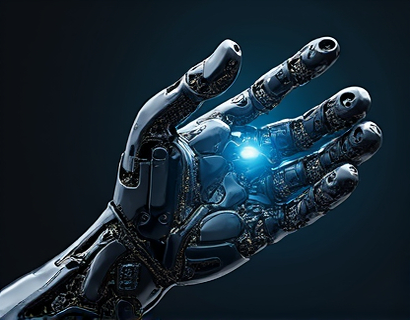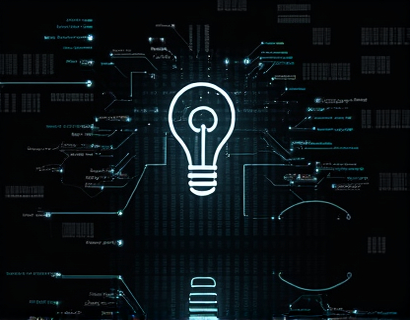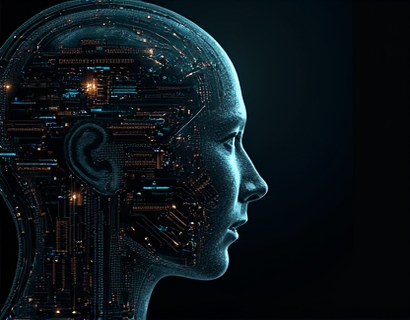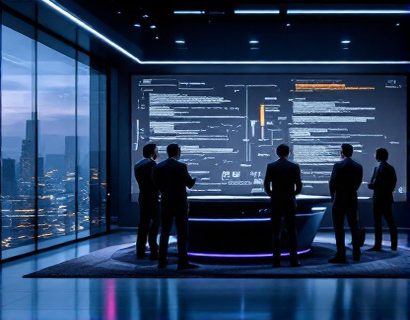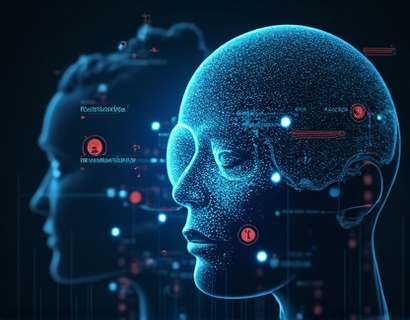AI-Powered Conflict Resolution: Navigating Adversarial Challenges with Intelligent Chat Solutions
The landscape of conflict resolution is undergoing a transformative shift with the integration of artificial intelligence (AI) technologies. This evolution introduces a new paradigm where intelligent chat solutions powered by AI are revolutionizing the way individuals and organizations navigate and resolve adversarial situations. These platforms leverage advanced algorithms and machine learning to provide personalized strategies and insights, empowering users to achieve strategic success in both personal and professional contexts. The focus here is on understanding how these AI-driven virtual platforms are reshaping the field of conflict resolution and problem-solving.
Understanding AI-Powered Conflict Resolution
AI-powered conflict resolution involves the use of sophisticated algorithms and natural language processing (NLP) to analyze and address complex adversarial situations. These systems are designed to understand the nuances of human communication, identify underlying issues, and propose tailored solutions. Unlike traditional methods that rely heavily on human mediators or predefined protocols, AI-driven platforms offer a dynamic and adaptive approach to conflict resolution. This adaptability is crucial in today's fast-paced and ever-changing environments where conflicts can arise suddenly and require immediate attention.
Key Components of AI-Driven Conflict Resolution Platforms
AI-driven conflict resolution platforms consist of several key components that work together to provide effective and efficient solutions. These components include:
- Natural Language Processing (NLP): This technology enables the system to understand and interpret human language, allowing for natural and intuitive interactions.
- Machine Learning Algorithms: These algorithms learn from past interactions and data to improve the accuracy and relevance of solutions over time.
- Emotion Recognition: Advanced AI systems can detect and respond to emotional cues, providing empathetic and context-aware responses.
- Decision Support Systems: These systems analyze various scenarios and provide strategic recommendations based on the specific context of the conflict.
By integrating these components, AI-driven platforms can offer a comprehensive and personalized approach to conflict resolution, addressing both the immediate and underlying causes of adversarial situations.
Personalized Strategies and Insights
One of the most significant advantages of AI-powered conflict resolution is the ability to provide personalized strategies and insights. Each conflict is unique, with its own set of circumstances, stakeholders, and emotional undertones. AI systems analyze the specific details of a situation to generate tailored recommendations that are more likely to be effective. This personalization is achieved through:
- Data Analysis: The system collects and analyzes relevant data from the conflict, including historical interactions, stakeholder preferences, and contextual information.
- Pattern Recognition: AI algorithms identify patterns and trends that can inform the resolution process, helping to predict potential outcomes and suggest proactive measures.
- Customized Approaches: Based on the analysis, the system proposes customized strategies that consider the unique aspects of the conflict, enhancing the likelihood of a successful resolution.
For instance, in a professional setting, an AI-driven platform might analyze communication patterns between team members, identify sources of tension, and suggest specific interventions to improve collaboration and reduce conflict. In a personal context, the system could offer advice on managing emotions and improving communication with a loved one, taking into account the individual's personality and relationship dynamics.
Empowering Users Through Intelligent Chat Solutions
Intelligent chat solutions powered by AI serve as a powerful tool for users to navigate and resolve conflicts. These chat platforms offer several benefits:
Firstly, they provide immediate access to expert-level guidance without the need for scheduling appointments or waiting for human mediators. This immediacy is particularly valuable in situations where timely intervention can prevent escalation.
Secondly, AI chat solutions are available 24/7, ensuring that users can seek help at any time, regardless of their schedule or location. This accessibility is crucial for addressing conflicts that arise outside traditional working hours or in remote settings.
Thirdly, these platforms offer a safe and anonymous space for users to express their concerns and receive guidance. The non-judgmental nature of AI interactions can encourage open and honest communication, leading to more effective conflict resolution.
Moreover, the interactive nature of chat solutions allows users to engage in a dialogue, ask questions, and receive real-time feedback. This interactive process helps users gain a deeper understanding of the conflict and the proposed solutions, fostering a sense of control and empowerment.
Case Studies and Real-World Applications
To illustrate the practical applications of AI-powered conflict resolution, consider the following scenarios:
Professional Workplace Conflicts
In a corporate environment, a team leader notices increasing tension between two employees. Using an AI-driven chat solution, the leader can input details of the conflict, including communication logs and past interactions. The system analyzes the data and suggests a series of steps to address the issue, such as facilitating a mediated discussion, providing training on effective communication, or recommending a temporary reassignment of tasks to reduce stress.
Another scenario involves a cross-functional project where differing opinions and priorities lead to deadlock. The AI platform can analyze the project's goals, the stakeholders' objectives, and the current dynamics to propose a compromise that aligns with the overall project vision while addressing individual concerns.
Personal Relationship Conflicts
In personal relationships, conflicts often involve emotional and psychological factors. An AI chat solution can help individuals navigate these complexities by offering empathetic guidance and practical advice. For example, in a situation where misunderstandings and miscommunications have led to a rift between partners, the system can suggest strategies for active listening, expressing feelings effectively, and rebuilding trust.
These case studies demonstrate the versatility and effectiveness of AI-powered conflict resolution tools in various contexts, highlighting their potential to transform how we handle adversarial situations.
Advantages Over Traditional Conflict Resolution Methods
AI-driven conflict resolution platforms offer several advantages over traditional methods:
Firstly, they provide a scalable solution that can handle a large volume of conflicts simultaneously, without the limitations of human resources. This scalability is particularly beneficial for organizations dealing with multiple conflicts across different departments or locations.
Secondly, AI systems can process and analyze vast amounts of data quickly, identifying patterns and insights that might be overlooked by human mediators. This data-driven approach enhances the accuracy and effectiveness of the proposed solutions.
Thirdly, the consistency and objectivity of AI-driven recommendations reduce the risk of bias, ensuring that all parties receive fair and impartial guidance. This objectivity is crucial in maintaining trust and credibility in the resolution process.
Lastly, AI-powered platforms can continuously learn and improve, adapting to new scenarios and feedback. This continuous improvement ensures that the solutions remain relevant and effective over time.
Challenges and Considerations
While AI-powered conflict resolution offers numerous benefits, it is essential to acknowledge and address certain challenges and considerations:
Firstly, the effectiveness of these platforms depends on the quality of the data and algorithms used. Biased or incomplete data can lead to suboptimal solutions, highlighting the need for rigorous data management and algorithmic transparency.
Secondly, while AI can provide valuable insights, it cannot replace the nuanced understanding and empathy of human mediators in all cases. In highly sensitive or complex conflicts, human intervention may still be necessary to ensure a comprehensive and empathetic resolution.
Thirdly, there is a need for user education and awareness to maximize the benefits of AI-driven conflict resolution. Users should understand how these platforms work, their limitations, and how to effectively engage with the technology.
Addressing these challenges requires a collaborative effort from developers, users, and stakeholders to create robust, ethical, and effective AI-powered conflict resolution tools.
Future Trends and Developments
The field of AI-powered conflict resolution is rapidly evolving, with several trends and developments on the horizon:
Firstly, the integration of emotional intelligence and affective computing will enhance the ability of AI systems to understand and respond to emotional cues, making interactions more empathetic and effective.
Secondly, the use of augmented reality (AR) and virtual reality (VR) can create immersive environments for conflict simulation and training, providing users with realistic and safe spaces to practice resolution skills.
Thirdly, the development of multi-lingual and culturally sensitive AI systems will expand the reach and applicability of these platforms, making conflict resolution more accessible globally.
Lastly, the incorporation of blockchain technology can ensure data integrity and privacy, addressing concerns related to data security and user trust.
These advancements promise to further enhance the capabilities of AI-powered conflict resolution, making it an even more powerful tool for navigating adversarial challenges.
Conclusion
AI-powered conflict resolution represents a significant leap forward in how we address and manage adversarial situations. By leveraging advanced technologies such as NLP, machine learning, and emotion recognition, these platforms offer personalized, efficient, and effective solutions. Whether in the workplace, personal relationships, or other contexts, AI-driven chat solutions empower users to navigate conflicts with greater ease and success.
As the technology continues to evolve, it is essential to embrace these tools while remaining mindful of their limitations and ethical considerations. By doing so, we can harness the full potential of AI-powered conflict resolution to build more harmonious and productive environments.



















